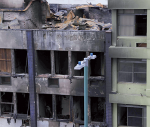You are here
Sustainability of Cerebral Palsy Foundation services threatened by lack of funds
By Dana Al Emam - Sep 27,2014 - Last updated at Sep 27,2014

AMMAN — Rehabilitation and educational services that the Cerebral Palsy Foundation (CPF) provides to its patients across the Kingdom are under the threat of suspension due to the lack of qualified trainers and adequate funding, according to its managing director.
“Around 4 per cent of Jordan’s population suffers from cerebral palsy, according to figures of the Higher Council for the Affairs of Persons with Disabilities, while statistics worldwide show that three persons in every 1,000 have the disease,” CPF Managing Director Abeer Sakejha told The Jordan Times is a recent interview.
But the “high” ratio of cerebral palsy patients is not met with sufficient public or private support, especially since most of the patients belong to families that suffer from financial difficulties, according to Sakejha.
“Each child needs a set of occupational therapy and physiotherapy sessions, in addition to articulation therapy sessions three times a week,” she said, adding that the weekly cost of sessions is almost JD40 per child, and that some families have more than one child with cerebral palsy.
The foundation cooperates with the Ministry of Health which sends therapists and doctors to its six rehabilitation centres across the Kingdom, and with the Ministry of Education, whose teachers are seconded to the CPF’s two schools.
Under the recently endorsed Civil Service Law, public sector employees cannot be seconded to another department for more than two years, which means that the foundation will lose some of its trained staff, Sakejha said.
“Some of the teachers working in our schools have up to eight years of experience in working with cerebral palsy children,” she said, adding that students and experienced teachers get along well and that the ministry’s teachers are not trained to deal with children with cerebral palsy.
The foundation provides the needed training for newly appointed teachers at its schools, a process that Sakejha described as “expensive and unproductive”.
“The case of cerebral palsy children must be taken into consideration by some sort of an exception in the law,” she said, noting that the foundation trains its teachers on dealing with the children’s spastic joints, a mission that not all teachers can perform.
The 68-employee CPF has rehabilitation centres in Amman, Zarqa, Irbid, Aqaba, Balqa and Karak, in addition to a school in Amman with programmes for kindergarten until grade 10, and another school in Aqaba.
“Our classrooms integrate other children with students diagnosed with cerebral palsy,” Sakejha said.
The lack of disability-friendly facilities and social stigma prevent children with cerebral palsy from enrolling at regular schools, she added.
At a recent meeting with media representatives, CPF President Nisreen Otaibi said the foundation regularly organises a month-long awareness campaign to educate school and university students about the condition, in addition to targeting local communities across the country at health centres.
Marking the national cerebral palsy day, which falls on the first Thursday of October every year, the campaign also educates the public on the condition through media outlets.
“We, as individuals and institutions, are aware that disability, regardless of its type or intensity, is not a reason for patients to surrender, neither is it a pretext for marginalising those with disabilities,” Otaibi said, adding that disability is a motivation for people to prove themselves as socially active citizens.
Since the foundation’s establishment in 1977, over 20,000 cerebral palsy patients have benefited from its medical, physiotherapy, rehabilitation and educational services, she noted.
The CPF president said the Arab Potash Company has donated a centre and a school in Karak Governorate to the foundation, which will open next February, urging the private sector to support the fight against cerebral palsy.
But the foundation’s Aqaba school might close its doors to students in the first three elementary grades, confining its services to the kindergarten level, due to lack of funds.
Cerebral palsy is a disorder of movement caused by a trauma to the developing brain, most often before birth, and causes impaired movement associated with exaggerated reflexes, floppiness or rigidity of the limbs and trunk, abnormal posture, involuntary movements and unsteadiness of walking, according to the Mayo Clinic website.
Related Articles
AMMAN — Funds allocated to the Cerebral Palsy Foundation (CPF) are not enough to support its eight centres located around the Kingdom.The fo
AMMAN — HRH Princess Alia Tabbaa, honorary chairperson of the Cerebral Palsy Foundation (CPF), on Thursday visited the Cerebral Palsy Model
AMMAN — “I collect plastic bottle caps, whether at home or when travelling, I collect them from everyone,” said Hania Kayyal.Kayyal, a lab d

















